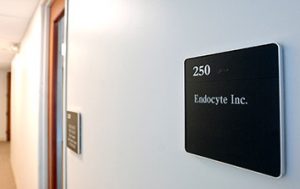
Indy-based NICO works for acceptance of less invasive brain surgery tools
Currently, only about 2-4 percent of U.S. brain surgeries for tumors, strokes and other abnormalities are done with NICO’s low-invasive approach.

Currently, only about 2-4 percent of U.S. brain surgeries for tumors, strokes and other abnormalities are done with NICO’s low-invasive approach.
The Indianapolis drugmaker's animal-health division is bulking up its companion-animal business by buying Boehringer Ingelheim International's U.S. feline, canine and rabies medications.
Rainer Fischer most recently served as senior executive director of the Fraunhofer Institute for Molecular Biology and Applied Ecology in Germany. The institute is part of the largest applied science research organization in Europe.

In a Q&A, Monon Bioventures CEO Joe Trebley talks about the goals and ambitions of his one-year-old firm.
Verdure Sciences has filed plans with Noblesville to build a 15,000-square-foot facility on a 7-acre property in the Metro Enterprise Park near the southwest corner of Pleasant Street and Union Chapel Road.
Bayer AG has agreed to buy Monsanto Co. in a deal valued at $66 billion, winding up four months of talks to create the world’s biggest supplier of seeds and pesticides.

European antitrust officials decided this month to launch a full-blown investigation into the proposed merger Dow Chemical Co. and DuPont Co.
The State Budget Committee has given its approval for Purdue University to build a high-tech, greenhouse-like facility where scientists will map plant genomes.

The West Lafayette-based company has named CFO and COO Mike Sherman as new CEO and president, but did not give a reason for the abrupt change in leadership.
Animated Dynamics Inc. has raised $1.7 million in early funding to help it get its technology to market.
Indiana-based Zimmer Biomet Holdings Inc. has agreed to buy LDR Holding Corp. for about $1 billion in cash to add surgical technologies for the treatment of patients with spine disorders.
Indiana inventors secured 30 percent more patents in 2015 than they did four years earlier.
And at more than 2,000, last year’s number is double the patents granted to Hoosiers in 2008, a low point for patents in the past two decades.
The news is the latest example of a huge shakeup in the agricultural industry.
While many college graduates are leaving the state, jobs in health care and life sciences in Indiana are booming, and employers are often searching high and low for talent.
IBJ gathered leaders in the life sciences industry for a Power Breakfast panel discussion April 21. Panel members included Colleen Hittle, managing director of Navigant; Suresh Garimella, Purdue University’s executive vice president of research and partnerships; Brian Barker, general manager of U.S. Seeds for Dow AgroSciences; Kristin Sherman, former chief financial officer of Calibrium LLC; and David Johnson, CEO of BioCrossroads.
Indianapolis-based agricultural Dow Agro on Thursday said revenue in the first quarter was $1.6 billion, down 16 percent from a year ago, as the company was hurt by high inventories, currency headwinds and lower prices.
 Shortages of workers and investment dollars remain the two biggest challenges for Indiana’s life sciences industry, which otherwise is showing robust vital signs and embarking on high-profile collaborations.
Shortages of workers and investment dollars remain the two biggest challenges for Indiana’s life sciences industry, which otherwise is showing robust vital signs and embarking on high-profile collaborations.

The Indianapolis Airport Authority board said it would “leave our options open and continue to search for the optimal project.”

Airport authority board Chairman Kelly Flynn sent an email Tuesday evening to other board members, telling them “we need to take a step back” on Athlete’s Business Network’s plan.
Many employees already made more than the state and national minimum of $7.25 per hour, but the hospital system said it wanted to be proactive. Workers who already made $11 to $12.99 an hour were also given a raise.